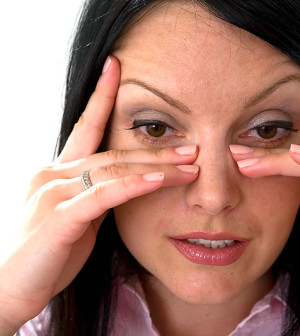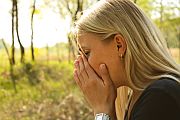- Could Your Grocery Store Meat Be Causing Recurring UTIs?
- Are You Making This Expensive Thermostat Error This Winter?
- Recognizing the Signs of Hypothyroidism
- 10 Strategies to Overcome Insomnia
- Could Artificial Sweeteners Be Aging the Brain Faster?
- Techniques for Soothing Your Nervous System
- Does the Water in Your House Smell Funny? Here’s Why
- Can a Daily Dose of Apple Cider Vinegar Actually Aid Weight Loss?
- 6 Health Beverages That Can Actually Spike Your Blood Sugar
- Treatment Options for Social Anxiety Disorder
Spring Allergy Season Could Be a Bloomin’ Nightmare


If you’ve got seasonal allergies, you probably already know that spring has finally arrived. And, some experts are predicting that this allergy season may be one of the worst in years.
After a long, cold, wet winter, trees and flowers all seem to be blooming at once, and that means a sudden, big burst of all different types of pollen at the same time.
Some experts are even predicting a “pollen vortex.”
The one bright spot? Because the pollen season started later, it’s likely to be shorter, according to Dr. Joseph Leija, an allergist with the Loyola University Health System’s Gottleib Memorial Hospital in Chicago. Leija has also been in charge of measuring the Midwest’s official pollen count for the U.S. National Allergy Bureau for the past two decades.
“The allergy season has been slow to start this year, but now we’re seeing a high pollen count from trees. They’re all pollinating together. This will be a heavy season, but since the pollination started quite late, it will be shorter,” Leija said.
Dr. Beth Corn, director of Clinical Immunology Faculty Practice Associates at Mount Sinai Hospital in New York City, said it’s difficult to quantify from year-to-year exactly how bad an allergy season might be, particularly from a patient’s perspective.
“Allergy season was bad last year, and it will be bad this year. People are very symptomatic now. But, remember, up until last week, we were still in winter coats in New York. People are noticing the stark contrast. Things have abruptly changed and people notice it,” she said.
The cities hit hardest by rough weather this winter may not see the worst of allergy season, according to the Asthma and Allergy Foundation’s Top Five Spring Allergy Capitals list. To make the allergy capitals list, a city has to have higher than average pollen counts along with higher than average medication use.
The cities given this dubious distinction for 2015 are: Jackson, Miss.; Louisville; Oklahoma City; and Memphis and Knoxville, Tenn.
But, no matter where you live or what the pollen count might be, you can take steps to ease your allergy symptoms.
The first step, said Corn, is to see an allergist and get tested so you know exactly what causes your allergy symptoms.
“It’s important to know what it is you’re treating, and when you’re seen by a specialist, they can tailor your treatment. You’ll get the most effective cocktail of medications,” Corn said.
Both over-the-counter and prescription allergy medicines are also available. And steroid nasal sprays can help relieve allergies, while eye drops can help control eye symptoms, according to Corn.
Leija pointed out that “controlling your environment as much as possible is important. Keep your windows closed and run the air conditioner inside the house, and when you’re driving, too. If you get pollen in your hair and clothing, don’t bring it into the bedroom.”
Leija also said it’s a good idea to change clothes before you come inside, or at least not in your bedroom. And, if possible, wash pollen out of your hair before getting into bed.
More information
Learn more about what causes allergies from the Allergy and Asthma Foundation of America.
Source: HealthDay
Copyright © 2026 HealthDay. All rights reserved.










